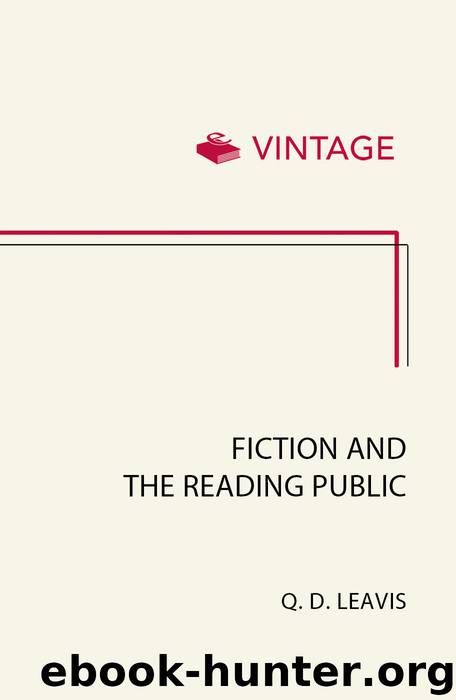Fiction and the Reading Public by Q.D. Leavis

Author:Q.D. Leavis [Q.D. Leavis]
Language: eng
Format: epub
Publisher: Random House
Published: 2014-03-31T16:00:00+00:00
Nothing can better illustrate the immense drop from the highly critical and intelligent society led by Charles Fox to later Victorian taste than the nature of Marie Corelli’s success. She was not merely the idol of the man in the street; Tennyson, Theodore Watts-Dunton, Queen Victoria, and the Prince of Wales were equally enraptured, Ardath ‘brought both Gladstone and the British ambassador at Madrid to her feet’ fn9, the Dean of Gloucester wrote expressing his admiration, Dean Wilberforce and Dean Farrar testified that her novels made for sweetness and light, the Dean of Westminster read from Barabbas from the Abbey pulpit on Easter Sunday, Lord Haldane wrote to tell her that her style was brilliant and her range of imagination very great, Lord Charles Beresford seriously envied her her gift of ‘incisive English,’ Mr. Asquith begged for an autographed copy of one of her books, Father Ignatius (described as ‘a prophet in his generation’) preached on The Sorrows of Satan and the hall was packed, streams of private carriages discharging far more of Marie’s readers than could be accommodated so that a similar sermon had to be delivered on the following Sunday, she was invited to lecture to the Edinburgh Philosophical Society and the lecture was enthusiastically received, she was invited to be the first lady to read a paper to the Royal Society of Literature, Ella Wheeler Wilcox literally did homage on her knees to the inspired novelist, and the Master of Magdalene and the Rector of St. Andrews University were among her firmest admirers. Marie’s own conception of her work is elaborately set forth in The Sorrows of Satan fn10, where the novelist heroine Mavis Clare is obviously less a day-dream than what she thought herself to be in fact. This ‘woman of genius with a thinker’s brain and an angel’s soul’ though sneered at by the critics, who are all in league against her (jealous of her ‘mental superiority,’ her success, and her moral purity), has a vast popular following; she attacks ‘modern science’ (identified with ‘atheism’ and ‘animalism’), the abuses of high life and contemporary literature, is noted for ‘the intellectual grasp and power’ of her novels and all the while preserves ‘a child’s heart and a child’s faith.’ It is safe to say that no novelist before so visualised himself. But once Hall Caine and Marie Corelli had—for reasons best explained by a psycho-analyst—discovered the novel as a means of satisfying their suppressed desires and so, since they were themselves emotionally uneducated, the starved desires of the vast bulk of the public, it was easy for other writers, eager to make money and not restrained by such a degree of fineness as to make the means distasteful, to imitate their accents.
Meanwhile intercourse with the French school of novelists had a remarkable influence on English writers whose attention had been attracted by the experiments of Flaubert, Zola, Maupassant, Turgeniev, Balzac, even of Victor Hugo, and for the first time in history we have a whole body
Download
This site does not store any files on its server. We only index and link to content provided by other sites. Please contact the content providers to delete copyright contents if any and email us, we'll remove relevant links or contents immediately.
Red by Erica Spindler(12575)
Crooked Kingdom: Book 2 (Six of Crows) by Bardugo Leigh(12319)
Twisted Palace by Erin Watt(11155)
Mindhunter: Inside the FBI's Elite Serial Crime Unit by John E. Douglas & Mark Olshaker(9344)
Fangirl by Rainbow Rowell(9254)
Never let me go by Kazuo Ishiguro(8902)
All the Light We Cannot See: A Novel by Anthony Doerr(8497)
A Man Called Ove: A Novel by Fredrik Backman(8439)
The Lover by Duras Marguerite(7903)
Confessions of an Ugly Stepsister by Gregory Maguire(7890)
Little Fires Everywhere by Celeste Ng(7201)
The Vegetarian by Han Kang(6303)
To All the Boys I've Loved Before by Jenny Han(5852)
The Shadow Of The Wind by Carlos Ruiz Zafón(5693)
On the Yard (New York Review Books Classics) by Braly Malcolm(5525)
Keepsake: True North #2 by Sarina Bowen(5414)
Dancing After Hours by Andre Dubus(5280)
Ken Follett - World without end by Ken Follett(4734)
The Perks of Being a Wallflower by Stephen Chbosky(4649)
